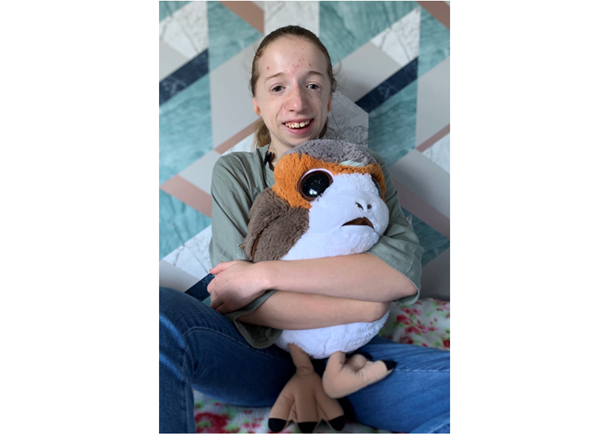Tips for managing hospital visits
Published Date: 14 Nov 2019
(Maia and her Porg!)
Our 14-year-old daughter, Maia, has made around 30 trips to the operating theatre over the years and had countless more check-ups. Hospitals are a normal and necessary feature of our family life and thankfully the expert care our daughter receives far outweighs the rigmarole of it all. Many children with hearing loss experience regular trips to hospital. It’s a road less travelled and as we find ourselves amid the teenage years we’re able to reflect a bit and are pleased to share a little of what works for us.
1. Plan
Without a doubt, getting a child to hospital and back is costly and disruptive. We’ve learnt to plan what we can and then deal with the delayed trains and other inevitable curve balls as needed. The actual hospital appointment is often a breeze in comparison. Normally we’re London-bound and try to travel off-peak to avoid both crowds and cost. We’ve also learnt to assume the trip will take longer than expected, being sure to celebrate the win if we get home early! Hospital car parks are extortionate and then there’s childcare for Annabel (Maia’s sister), time off work and cancelling or rearranging any other commitments.
Upon returning home, we do our best to keep life as gentle as possible. Even if it’s just been a day trip it leaves us tired, and there’s schoolwork and chores to catch up on. We also need to update teachers, clubs and family members to update on the outcomes of medical appointments and time that needs to be spent just the four of us.
2. Coping mechanisms
All these medical experiences require grit and we’ve needed to help Maia cope in different ways as she’s grown-up (and help the whole family process it too). It’s really hard to find the balance between preparing your child for important surgery and playing it down so they can sleep at night. As a little one, it was all about singing Miss Polly had a Dolly and if there was a character who went to hospital (Peppa Pig, Topsy and Tim) we had the book. These days, Maia prefers R.J Palacio’s Wonder (which features a character with Treacher Collins Syndrome), the awesome YouTuber Nikki Lily or her real-life connections with other people living with conditions that spur her on.
Pre-surgery, distraction has always been key and the paediatric staff are wizards at this. Familiarity has enabled us to know what to expect and it’s now been a while since Maia needed a pre-med to take the edge off. Last summer she strode off to theatre with her giant stuffed Porg (from Star Wars), discussing the merits of cute fantasy creatures with the nurse.
3. Have some fun
Most of Maia’s medical jollies are to Great Ormond Street Hospital (GOSH) which is superbly situated for a spot of London fun. Even on our most hurried trips, our route from St Pancras to GOSH takes us past gems such as The British Library, The Brunswick Centre and Coram’s Fields. The hospital is wonderful but we do appreciate a little breathing space before travelling home. It gives us a chance to chat through the doctor’s advice while it’s still fresh in our heads, soothe any jangled nerves and it can turn the most routine of visits into something special.
In case you’re interested, I did take the opportunity to ask my family what their essentials are. Maia asked "Can we hit the shops next time?" Annabel added "I’m coming too!" and Martin said "coffee!" That’s how we roll!
